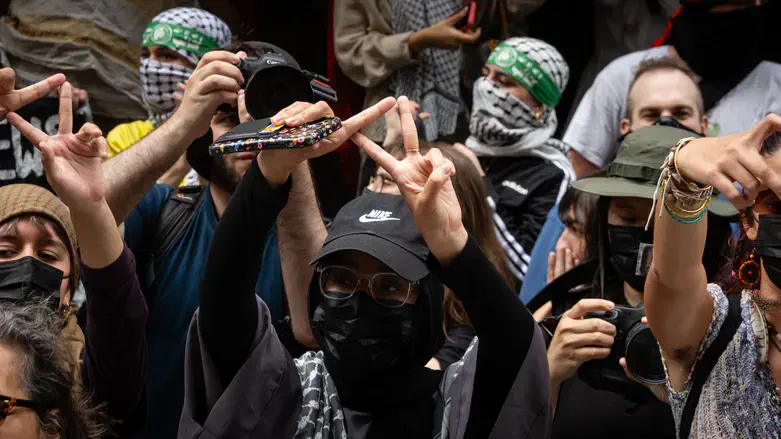
(New York Jewish Week) — New York City Council members are calling on CUNY to act after multiple Hillel events have been protested by anti-Israel activists calling to “bring the war home.”
One of the CUNY campuses, Baruch College, told the New York Jewish Week it condemns the protests and is committed to student safety. But in a reflection of the challenges facing the 25-campus public college system, Baruch’s statement noted that the protest took place in a public space, limiting the steps the university could take to combat it.
The Hillel centers at Baruch as well as Hunter College were both recently picketed with identical banners reading, “Bring the war home,” and, “Hillel go to hell.” The banners also featured an inverted triangle, a symbol of Hamas, as well as a picture of an assault rifle.
On Tuesday, as Jewish students dined at a kosher restaurant in midtown Manhattan as part of a Baruch Hillel-organized back-to-school event, they were protested with the same banners by an organized group whose students are affiliated with CUNY. Video from the protest posted by the Hillel also showed the small group of protesters singling out the Hillel’s director, chanting, “Ilya Bratman what do you say? How many kids did you kill today?”
“At what should have been a warm welcome for new students at our annual Welcome Back Dinner at the kosher restaurant Mr. Broadway in midtown, we were met with hate instead,” Baruch Hillel posted on Instagram. “This is the reality Jewish students are facing today on American college campuses.”
Bratman, executive director of Baruch Hillel, which operates as a seven-college consortium within the CUNY system, did not respond to the New York Jewish Week’s request for comment.
A Baruch College spokesperson told the New York Jewish Week that police were on hand to ensure safety at last week’s protest at Hillel.
The Baruch representative also said the protesters were not part of an approved campus group, though they did not say which group was involved in the demonstration. An Instagram post from Baruch Students for Justice in Palestine, however, shows the chapter had put out a call for “support” at the address for Mr. Broadway on West 38th Street and Baruch Plaza at East 25th Street.
However, the representative added that the plaza where the rally took place is a public space and not on Baruch College property, and is thus subject to First Amendment protections. Other local campuses, such as Columbia University, have closed their gates to people unaffiliated with the university in a bid to tamp down protests. But CUNY’s branches, which are largely urban, cannot do the same.
“Baruch is outraged by the language used at a protest on Tuesday on a public plaza near our campus and condemns all speech that is designed to harass and intimidate others,” the Baruch representative said in a statement. “NYPD and our public safety officers were on-site to ensure the safety of our students, faculty, and staff. Hillel is a valued member of our community, and we remain steadfast in our commitment to a respectful and inclusive campus environment for every student.”
City Council members still want the school to do more. In a letter addressed to CUNY Chancellor Félix V. Matos Rodriguez and Board of Trustees Chairman Bill Thompson, members of the council’s bipartisan Jewish Caucus asked for updated free speech and protest guidance from the university system in response to the demonstrations.
“As the fall semester begins, CUNY must balance every student’s right to free speech with every student’s right to a safe environment, free from harassment and intimidation,” reads the letter, which was signed by Council members Inna Vernikov, Eric Dinowitz, Julie Menin, Lynn Schulman and Lincoln Restler. “CUNY should follow the example of SUNY Buffalo, New York University, and dozens of universities across the state and country, who have timely and proactively issued guidance.”
The letter asks CUNY to clarify “guidance regarding on-campus protests, encampments, boycotts, disruptions, intimidation, harassment, walk outs, and other related actions,” and to do the same for faculty demonstrations. It also requests that the system “organize interfaith dialogue including groups of different faiths,” such as Hillel.
Neither representatives for Hunter College nor CUNY responded to the New York Jewish Week’s requests for comment.
Dozens of students were arrested last spring at multiple CUNY campuses, as police cracked down on pro-Palestinian lockdowns. In response, this year CUNY leaders have sought to foster respectful environments on campus.
“Even as we may express differing viewpoints, we commit to doing so with equal measures of care, candor, and respect, mindful that freedom of expression and dissent exist in the context of civil rights guaranteeing that none of us may be excluded from the benefits of our educational environment on account of our identities,” Hunter College President Nancy Cantor wrote in a note published on the school’s website on Aug. 28. “Protest or demonstration may proceed so long as neither force nor the threat of force is used, and so long as the college’s processes for functioning as an educational institution are not interrupted.”
One day later, the protesters picketed her campus’ Hillel.